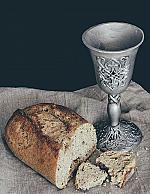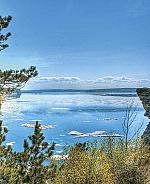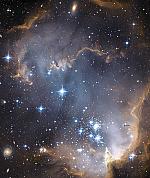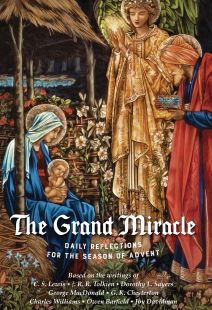Day 12. The grand miracle

[above: The crocus heralds the coming spring. Image by Екатерина Киселёва from Pixabay]
Therefore the Lord himself shall give you a sign; behold, a virgin shall conceive, and bear a son, and shall call his name Immanuel. (Isaiah 7:14, KJV)
The Christian story is precisely the story of one grand miracle . . . what is uncreated, eternal, came into nature, into human nature, descended into His own universe, and rose again, bringing nature up with Him.
—C. S. Lewis, Miracles
For the two decades between 1943 and his death in 1963, C. S. Lewis annually read his friend Dorothy L. Sayers’s radio plays on the life of the Incarnate Christ, The Man Born to Be King. And every time, as he testified at Sayers’s funeral in 1958, he was “deeply moved.” Throughout Lewis’s writings we see this emotional and imaginative engagement with the Incarnation—not just as a brief episode portrayed once a year in church pageants, but as the single central event that changes everything.
In his book Miracles, Lewis imagines Christ as a deep-sea diver working on a salvage project: plunging down into his own fallen creation “in order to bring the whole ruined world up with him to new life.” In The Lion, the Witch and the Wardrobe, when the lion Aslan reenters the world he created, he breaks the hold of a long, hopeless winter, returning it to the new life of spring and restoring flesh and blood to hapless souls imprisoned as stone statues.
His sci-fi story Perelandra culminates in a hymn to God’s “Great Dance”: “In the Fallen World He prepared for Himself a body and was united with the Dust and made it glorious for ever. This is the end and final cause of all creating. . . . Blessed be He!”
How can we even imagine what this means for us, that we dust-creatures will be glorified and “brought up with him”? In Mere Christianity Lewis concludes: “The whole offer which Christianity makes is this: that we can, if we let God have his way, come to share in the life of Christ.”
No wonder Lewis was so deeply moved by the Incarnation. So should we be too!
PRAYER: Lord, you have come to draw us up to you along with all of nature, to share with us your very life! This Advent, move us to wonder at your coming to earth as one of us—and to rejoice and be deeply moved at what it all means. Amen
By Chris R. Armstrong
[Christian History originally published this article in Christian History Issue #133+ in 2019]
Chris R. Armstrong serves as senior editor of Christian History magazine and as a program fellow at the Kern Family Foundation. He blogs at gratefultothedead.com and recently authored Medieval Wisdom for Modern Christians.Next articles
Day 13. The fire of Christ within
All of human history is centered on the Incarnation.
Edwin Woodruff TaitDay 14. More of God and less of me
We fix our gaze on the crown more than on the King
David C. DowningDay 15. Enjoy God forever
The joy that surprises us is that of actually finding what we long for.
George MarsdenDay 16. The holy one
Charles Williams often depicted the fear of his fictional characters when they encountered the transcendent.
Marjorie Lamp Mead







